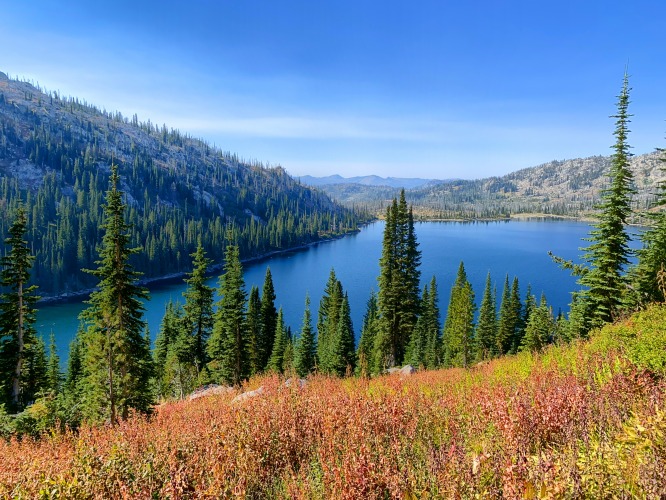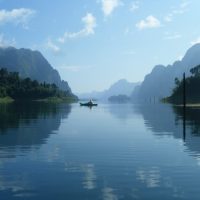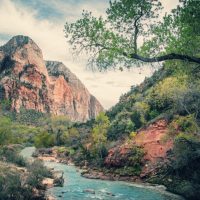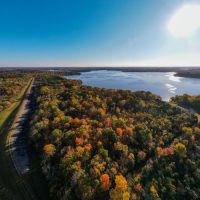Yes! Alligators live in Idaho.
Shocked?
So am I!
Since moving to Washington State in 2017, I have learned a bit more about the Pacific Northwest.
This includes the state of Idaho, located to the east of WA and on the same latitudinal line.
Therefore, finding out that Idaho actually has alligators–when it is too cold in South Carolina’s Lake Hartwell for them to live–I am surprised for sure.
How do alligators live so far north and what does this mean for Idaho residents–and swimmers?
Find out more about alligators in Idaho in this helpful guide about these animals.
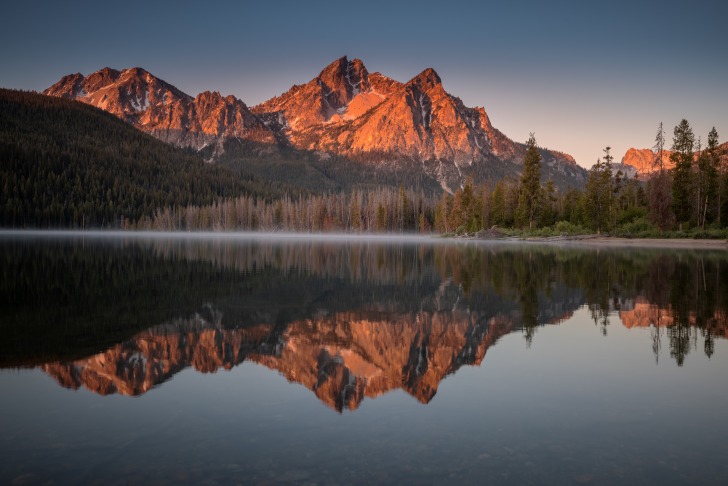
Contents
So… Are There Alligators in Idaho?
You can find alligators in select parts of Idaho, it is true, but not everywhere is home to these rough-backed reptiles.
The place where you can go to see alligators alive and snapping is at Miracle Hot Springs.
This is a natural hot spring and soaking bath facility that is located in Buhl, ID.
On the Miracle Hot Springs’ Facebook page, the hot springs reported that alligators had found their way into the hot springs.
And it’s not a social media hoax about alligators for once!
The reason that alligators could show up at the hot springs–other than because they wanted to request a facial and a massage–might be because the area is desert country.
The landscape has excellent conditions for alligators in residence.
And evidently, the animals made their way to Idaho by unscrupulous means, such as human owners who take in these reptiles as exotic house pets.
“In the high desert in southern Idaho, tucked beside the Snake River near Buhl, commercial fish farmer Leo Ray has found the perfect place for raising catfish, tilapia, trout, sturgeon – and alligators. That’s right: alligators,” reports the Missoulian.
However, the only way these animals could get there would be through human transport–or trafficking.
Pet alligators, alligators from zoos, and those gators featured in exhibits could potentially be brought to Idaho and set free successfully.
This means that alligators are able to live in the climate of Idaho, and evidently amongst the natural fauna inhabiting the Snake River and its valleys and desert terrain.
So what gives?
Alligators can live in the arid climate of Idaho in the southern part of the state.
But the state does not recognize the animal species as a part of the flora and fauna that make up Idaho’s backyard.
Alligator Species in Idaho
According to Idaho Fish and Game, there are no alligators in Idaho.
They do not give alligators as a genus a state rank or consider the reptile to have a presence in the state.
Additionally, the Snake River reports and the Miracle Hot Springs do not note the type of alligator found in this region.
Yet, the American alligator is the most common type of alligator in the US and North America.
Therefore, it is presumed that the American alligator is the alligator species that would be in Idaho unless an exotic alligator species has been introduced.
This would include the Chinese alligator, which is highly prized for its skin that is used for purses and handbags.
However, the Chinese alligator is only found outside of North America.
Is it Safe to Swim in Idaho?
Yes, tourism in Idaho involves swimming in rivers, streams, lakes, and ponds in Idaho.
Since this is a landlocked state, there are no oceans in Idaho.
However, the Snake and Columbia rivers both flow into the state and bring with them Pacific Ocean creatures that can live in saltwater and freshwater.
Swimming, as well as boating with motorized vessels and paddle crafts, are highly promoted by the Idaho Department of Commerce – Tourism Development.
This includes more than 130 hot springs open for public use, as well as more than 3,000 miles of whitewater that can be taken by raft, kayak, or canoe.
These waters are great for swimming and beaches dot rivers and lakes throughout Idaho.
Therefore, swimming is both safe and highly recommended by Idahoans whether you are vacationing or moving to the state.
Interesting Alligator Facts About Idaho
As for alligators, you would want to be watchful of these animals, especially in the Snake River region.
Hot springs, evidently, make for a popular place to live for an alligator, too.
It has to do with the hot water that is perfect for their cold-blooded body type.
Alligators can’t live in climates that are too cold, such as Idaho in the winter, without having a hot spring to keep them warm.
The concern is that these reptiles are not able to travel to Idaho on their own.
The natural habitat for the American alligator, which is the common alligator in the US, is in the southeast.
This includes the states of Georgia, Florida, Alabama, and South Carolina.
Other than these four states, alligators do not naturally live in the US.
Additionally, the northwestern state of Idaho is diagonally as far as it can be from the southeast.
Getting an alligator to travel this far would require human intervention.
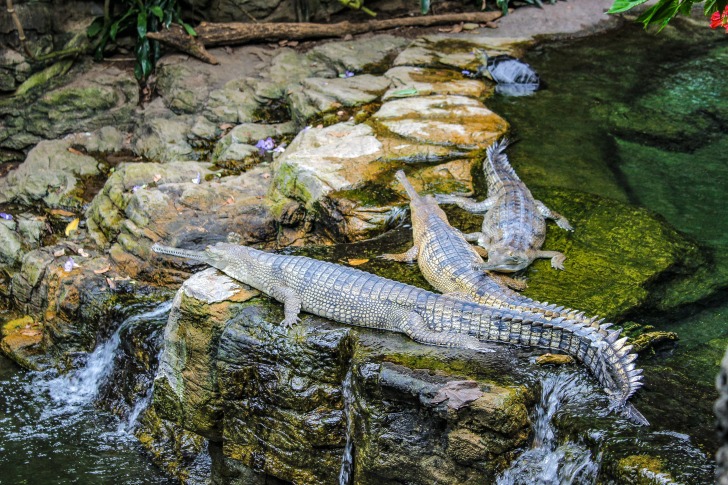
Alligators vs. Crocodiles
If you see a reptile that looks like an alligator in Idaho, say, while visiting a hot spring for soaking, you may be wondering if it is a crocodile.
There are many differences between an alligator and a crocodile.
For starters, an alligator looks slightly different in its features.
Compared to a crocodile, the alligator is about half of the size of a full adult.
A male American alligator is anywhere from 8 to 15 feet when fully grown.
A female alligator of the same species is only 8 feet long on average.
A saltwater crocodile male averages 17 feet in length and can be as long as 23 feet long!
That is twice the length of the largest alligator.
Therefore, if you see a reptile that is of massive size in the Idaho rivers or streams, you are most likely to see a crocodile–and that’s nearly impossible.
Chances are more likely that you will see a much smaller alligator, and this would still be terrifying to most people.
The reason why alligators and crocodiles are not called by the same name is that they are both in the Crocodylia order of reptilians.
Yet alligators and crocodiles are not in the same family.
Several differences are the culprit.
For instance, crocodiles cannot grow back a tail if they have severed that limb, while alligators can regenerate a tail–but not their other limbs.
Alligators have rounded noses whereas crocodiles have pointed snouts.
This is often the basic way to identify an alligator versus a crocodile in the wilds of Idaho.
3 Safety Tips for Swimming in Alligator-Infested Waters
- If you must swim in alligator-infested waters, bring a buddy or two for protection. When swimming with alligators, the more the merrier to ward off the reptiles from attacking. If your group looks like a giant sea monster with 16 legs and 16 arms, that’s going to be more intimidating to an alligator than just eight lonesome individuals swimming.
- Be loud and obnoxious. The more noise you make, the bigger you appear to the alligators. This will help you scare these thunder lizards that are known to make vibrations on the ground. Work against their nature and make vibrations yourself through loud sounds. If you have music, turn it up! This might also help to ward off predatory alligators.
- Avoid a fight. If alligators are overtaking the Idaho waterway where you are swimming, it is best to move to another swimming beach or hot spring.
Idaho Safety Overview
READ THE FULL REPORT: Idaho Safety Review
Safety Index:
- OVERALL RISK: MEDIUM
- TRANSPORT & TAXIS RISK: LOW
- PICKPOCKETS RISK: LOW
- NATURAL DISASTERS RISK: LOW
- MUGGING RISK: LOW
- TERRORISM RISK: LOW
- SCAMS RISK: LOW
- WOMEN TRAVELERS RISK: LOW
Frequently Asked Questions
Should I be concerned about alligator attacks as a resident living in Idaho?
Potentially, if you reside in southern Idaho, you could be a victim of an alligator attack.
There are a few ways your chances increase.
First, if you are going rafting, boating, fishing, or swimming in the Snake River or southern Idaho, you might be a target of wild alligators in the waterways.
Hot spring soakers should also be wary of alligators turning up in the warm waters for their turn to soak.
Where does the Snake River flow, since that river has alligators in Idaho?
The Snake River flows from Washington into Idaho and ends east in Wyoming.
A small part of the river scales down into Oregon along the Oregon-Idaho line.
Therefore, it is possible to see alligators along the Snake River territory, but you are not likely to see a saltwater crocodile.
How do I react if I see an alligator in Idaho?
If you find out there is an alligator in your backyard, swimming pool, or soaking tub in Idaho, the first thing you should do is call 911.
Reporting this to animal control is also an option.
However, you want to move fast and react in a timely manner.
This way, you are able to get authorities on the scene to take care of the alligator.
Finding a new safe place for the alligator to live will be the top priority.
Additionally, having a professional to remove and transport the alligator is also key to public safety in Idaho.
Can alligators live safely in Idaho?
Yes, alligators can live safely in Idaho, but there are issues with new predators–mainly wolves.
The wolf population is healthy in Idaho, with 1,500 or so wolves out on the prowl as of 2019.
In the southeastern US, wolves are not found in the wild with alligators.
Therefore, this predator among other desert dwellers in Idaho can make life more difficult for alligators that are bred in captivity or rescued.
However, the issue of too-cold weather is not a problem for alligators in Idaho thanks to the desert terrain.
Is it legal to own an alligator in Idaho?
No, it is not legal and you are breaking the law if you own an alligator in Idaho.
KTVB News reports, “American Alligators are technically illegal to own in Idaho, but Maxey has a special permit from the Idaho Department of Fish and Game that allows him to house the rescued reptiles.”
Therefore, if you have rescued an alligator in the rivers of Idaho, you may be able to keep the reptile at home.
